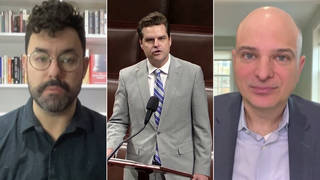
Related
Harriet Miers withdrew her nomination Thursday to be a Supreme Court justice. She had come under intense criticism from the Christian Right and many Republican senators. We have a roundtable discussion on Miers’ withdrawal and the political implications, and what may lie ahead in the next nomination. [includes rush transcript]
In a letter to the White House, Miers said she was concerned that the confirmation process “would create a burden for the White House and our staff that is not in the best interest of the country.” Miers went on to write that she needed to withdraw because Senators were seeking White House records that could not be released because of executive privilege.
- Arlen Specter, chair of the Senate Judiciary Committee: “I’m sorry to hear that Ms. Miers has decided to remove her name from consideration. I think that this is a sad episode in the history of Washington D.C., which has a lot of sad episodes. But the way Harriet Miers has been treated has been really disgraceful.”
Harriet Miers and President Bush have been close friends for nearly two decades. Miers began working for Bush when he was running for governor of Texas in 1994. She remains White House counsel. Miers would have become the third woman to serve on the Supreme Court. President Bush said he reluctantly accepted the decision of his White House counsel and longtime ally and would move quickly to fill the vacancy on the court created by the retirement of Justice Sandra Day O’Connor.
- Ralph Neas, president of the People for the American Way Foundation.
- Makan Delrahim, partner at Brownstein, Hyatt and Farber. From 2000-2003, he was Chief Counsel and Staff Director to the Judiciary Committee of the Senate. He also is a former Deputy Assistant Attorney General for the Antitrust Division in the Department of Justice.
- John Nichols, Washington correspondent for The Nation Magazine and author of the the Online Beat on The Nation website. He is also associate editor for the Madison Capital Times.
Transcript
AMY GOODMAN: But it was Senate Minority Leader, Harry Reid, who lamented the decision.
SEN. HARRY REID: Ms. Miers didn’t satisfy those who want to pack the Supreme Court with rigid ideologies. The only voices heard in this process were the far right. She wasn’t even given a chance to speak for herself before the Senate Judiciary Committee.
AMY GOODMAN: In a letter to the White House, Miers said she was concerned the confirmation process, quote, “would create a burden for the White House and our staff that is not best in the interest of the country,” she said. Miers went on to write she needed to withdraw, because senators were seeking White House records that could not be released because of executive privilege. This is the Chair of the Senate Judiciary Committee, Arlen Specter.
SEN. ARLEN SPECTER: I’m sorry to hear that Miss Miers has decided to remove her name from consideration. I think that this is a sad episode in the history of Washington, D.C., which has a lot of sad episodes, but the way Harriet Miers has been treated has been really disgraceful.
AMY GOODMAN: That was Arlen Specter. Harriet Miers and President Bush have been close friends for nearly two decades. Miers began working for Bush when he was running for governor of Texas in 1994. She remains White House counsel. Miers would have become the third woman to have served on the Supreme Court. President Bush said he reluctantly accepted the decision of his White House counsel and long-time ally and would move quickly to fill the vacancy on the court created by the retirement of Justice Sandra Day O’Connor.
We’re joined now in Washington, D.C., by Ralph Neas, President of People for the American Way Foundation. We’re also joined by attorney Makan Delrahim. From 2000 to 2003, he was chief counsel and staff director to the Judiciary Committee of the Senate. He also is a former Deputy Assistant Attorney General for the Antitrust Division in the Department of Justice. On the line from Madison, Wisconsin, is John Nichols, Washington correspondent for The Nation magazine, associate editor for the Madison Capital Times. We’re going to begin with Ralph Neas, People for the American Way. Ralph, can you talk about Harriet Miers’s decision to withdraw as a nominee to be Supreme Court justice?
RALPH NEAS: Amy, I have been working on Supreme Court nominations since 1975, when I was Republican chief counsel to Senator Edward W. Brooke. I have never seen anything like this. This has been an astonishing spectacle. The President was attacked from within his own base, and he was pounded day after day, as was Harriet Miers. He basically surrendered. It was an abject total capitulation to the rightwing special interest groups. They want someone on the court that is going to be a guaranteed vote to overturn scores of Supreme Court precedents going back 70 years, affecting privacy, equal opportunity, the environment, religious liberty, reproductive health, reproductive rights. Harriet Miers, to them, was someone they didn’t know. They didn’t know where she was on a judicial philosophy. They demanded, they dictated that the President withdraw this nomination. I’m not sure this has ever happened before. It’s a great sign, a very convincing sign of how powerful the radical right is that they can force a president of the United States to withdraw his own nominee before the hearings even begin, before she has a chance to defend herself.
AMY GOODMAN: John Nichols, in Madison, Wisconsin, your response to the timing of the nomination?
JOHN NICHOLS: [inaudible], Amy. Is that what you mean?
AMY GOODMAN: Yes. The timing, rather, of the withdrawal.
JOHN NICHOLS: The timing of the withdrawal is incredibly significant and, well, I agree completely with Ralph Neas that what undermined Harriet Miers was the attack from the right. The withdrawal was a complete political act. It was done not by Harriet Miers. She did not reluctantly withdraw. The President did not reluctantly accept the withdrawal. What happened was, early this week, the White House political office began calling around to rightwing groups, saying, 'How can we most conveniently, most effectively withdraw this nomination?' They began laying the base well before it actually occurred. And they were doing it with an eye toward doing the withdrawal on the day before, if they could most effectively do it, on the day before the indictments would come down in the Patrick Fitzgerald investigation of Libby and Rove.
And their purpose for that was obvious. You withdraw this nomination. You get a day of national attention to the withdrawal. Here we are talking about it. And that tamps down some of the speculation about who is going to be indicted, as well as some of the speculation about how close it will go to the President and Vice President. At the same time, once the indictments come, then we forget about Harriet Miers. As Trent Lott said yesterday afternoon, who is going to remember Harriet Miers next week? So, this is a very political act done by an administration which, intriguingly enough, is often credited for being loyal. The President is often said to be excessively loyal. Well, here he had really someone who is said to be one of his very best friends, and he threw her to the side with the sole purpose — the sole purpose of making sure that he could be in the right political position when some very embarrassing indictments came down.
AMY GOODMAN: I want to go to Makan Delrahim, again, worked with Justice Priscilla Owen, is a partner at Brownstein, Hyatt and Farber, chief counsel and staff director to the Judiciary Committee of the Senate, 2000-2003. Can you talk about Harriet Miers and your position on her nomination, and then your response to her withdrawal?
MAKAN DELRAHIM: Amy, yes. You know, I have worked with a number of, what some called, controversial nominees and was there during some of the filibuster debates and worked closely with Ralph. We have been friends and collegial adversaries, and I love some of the spin in Washington. I think Harriet Miers was looking forward to the committee, and Republicans, not a single one — some expressed reservation, but nobody opposed her. And I think what began happening is some of the pro-abortion groups started getting uncomfortable with some of her positions that was being expressed, some of the memos, some of the comments she had made. And you noticed a lot of Democrats beginning to sound the signs of alarm, yet Senator Schumer, Senator Boxer, who said very negative things and raised a lot of concerns about her qualifications, and I think what happened was that she realized that she was going to get to an impasse on the committee, and I think the Democrats waited, but they were very concerned that she might get on the court, and there was a lot of pressure. And I think my friend Ralph here was — is sighing a little bit of relief this morning, as are some other Democrats, that she was withdrawn and are saying that it was because of rightwing groups, and I don’t think that had anything to do with it. I think it was just the fact that they noticed that Democrats were going to be asking her questions she couldn’t answer and ask for documents that she couldn’t give, and ultimately it was going to be an impasse, which was going to cause her to cross the line between her loyalty to the President and her duties of candor before the Senate Judiciary Committee.
AMY GOODMAN: Makan Delrahim, former chief counsel and staff director to the Judiciary Committee of the Senate, also Ralph Neas in Washington of People for the American Way, as well John Nichols on the phone. We’ll be back with them in a minute.
[break]
AMY GOODMAN: As we talk about the withdrawal of the nominee, Harriet Miers, the White House counsel, as Supreme Court justice, our guests, Ralph Neas, President of the People for the American Way; Makan Delrahim, a partner with Brownstein, Hyatt & Farber, formerly Chief Counsel and Staff Director to the Judiciary Committee of the Senate; also on the line with us, we’re joined by John Nichols of Madison, Wisconsin, of The Nation, and Madison Capital Times. Makan Delrahim, can you talk about the response of the Christian right, the conservatives who opposed Harriet Miers, and their response to your support for her?
MAKAN DELRAHIM: Well, I think that there were some concerns raised not so much because of concerns about her record, but just lack of verification of where she stood on some of the principled views of — is she a strict constructionist, and does she view the Constitution and the fundamental principles within the Constitution interpreting cases, or does she view it as an evolving document. And I think the important thing now is to really step back, just like Senator Schumer said yesterday, and start fresh, look to the majority of the population, not some of the folks all the way either to the right or to the left, and start fresh on an important, important nomination to our nation’s Supreme Court, and put somebody up there who will strictly interpret the Constitution, instead of making law and nullifying property rights, ruling that child pornography laws are unconstitutional, and Congress didn’t have the power, or, you know, issues like the Pledge of Allegiance, and putting up there folks who are honorable, who have the qualifications, like a John Roberts, that can strictly interpret the Constitution and go on the court. And I think, as a country, that’s what we should be focusing on and not looking back to the Miers nomination.
AMY GOODMAN: Ralph Neas of People for the American Way, on the issue of this being a victory for conservative activists, if that’s what President Bush was responding to, even if liberals and Democrats, progressives, were opposed to her nomination, then what do you expect to happen next? Who do you expect to be nominated next?
RALPH NEAS: It’s important, number one, to point out the progressive community and the Democrats had not taken a position on Harriet Miers. The position was that she should have hearings and have an opportunity to tell the American people and the Senate what her judicial philosophy is and address the issues of judicial independence. The tipping point probably came two days ago when the Washington Post put out a story that had her speeches from the 1990s, where she talked about self-determination for a woman and her choice regarding reproductive rights. The right wing went crazy, and I think absolutely demanded that she withdraw immediately. In terms of what it means, I think that the right has dictated the withdrawal of Harriet Miers. I think they’re going to dictate who the President nominates now. They have made it clear it has to be someone like Robert Bork, Antonin Scalia or Clarence Thomas. They will accept no one less than that. As one rightwing senator said two days ago, 'We need tangible, objective evidence of where she's going to be on these key Constitutional issues.’
AMY GOODMAN: Makan Delrahim, Chief Counsel, former Staff Director for the Senate Judiciary Committee, who are some of the possibilities that you see next, and can you talk about, in particular, Judge Priscilla Owen, someone you know and have worked with?
MAKAN DELRAHIM: Sure. I worked on her confirmation, her elevation from the State Supreme Court in Texas to the Fifth Circuit through some of the efforts to filibuster her. She is an extremely qualified jurist, experienced lawyer, a remarkable woman, who has served on the Texas Supreme Court and now for a little over a year on the Fifth Circuit. She would make an excellent nominee. She is one who — some folks would say that her views on abortion are suspect, because she had a ruling on parental notification. And I think the President and Republicans in the Senate would welcome a national debate on parental notification, whether or not my teenage daughter wants to get an abortion, whether I should just get noticed, not even consent. And I think that’s an issue that is up for debate.
But I think some of the others who are good candidates, you hear Judge Mark Horrigan. You’ve got — I think, another excellent nominee in the likes of John Roberts would be a Carolyn Kuhl, who was nominated before and then ended up withdrawing after some efforts to filibuster her. An excellent nominee that nobody has really talked about would be the Solicitor General of the United States, Paul Clement, who is a brilliant lawyer, has argued over 20 cases before the Supreme Court, of the same ilk of, you know, Justice Douglas. He is, I think, 39 years old, and I hope people begin considering her, somebody who got unanimously confirmed to the Solicitor General’s job and many called the tenth Justice of the Supreme Court. It would be nice to make him the ninth Justice of the Supreme Court.
AMY GOODMAN: Ralph Neas of People for the American Way, your response on Judge Priscilla Owen and the other people that Makan Delrahim just mentioned and others you are looking at?
RALPH NEAS: There’s no question that if the President nominated Priscilla Owen, it would precipitate an extraordinary confrontation, and I think that there would be a majority of the Senate that would oppose her, because she not only has a rightwing judicial philosophy in the mode of Clarence Thomas and Robert Bork and Antonin Scalia, but she has been a judicial activist, allowing her ideology to trump her responsibilities as a jurist on the Circuit Court. In fact, Alberto Gonzales, the Attorney General of the United States, served with Priscilla Owen on the Texas Supreme Court.
On eleven different occasions, not once — everyone remembers Alberto Gonzales saying, with respect to the parental notification case, that she was remaking the Texas law and was engaged in an unconscionable act of judicial activism. Well, on ten other occasions he accused her also of being a judicial activist. That’s why the Senate Democrats filibustered. It wasn’t just because of her rightwing judicial philosophy, but she allowed that philosophy to overrule her judgment and her duties as a jurist. So that would precipitate definitely.
I don’t think there would have to be a filibuster, because I think enough Republicans would join the Democrats, because of her views on reproductive rights and privacy, civil rights, consumer issues — she always rules for big business — and certainly on the environmental protections. This would be one of the four or five most controversial nominees.
AMY GOODMAN: We’re talking to Ralph Neas of People for the American Way and Makan Delrahim, who was formerly staff head of the Senate Judiciary Committee. Ralph Neas, what about other people who have been put forward, like Janice Brown and others that Makan Delrahim mentioned, Ralph Neas?
RALPH NEAS: With respect to Janice Rogers Brown, I think along with Priscilla Owen and Michael Luttig and Edith Jones and Emilio Garza and others, among the most controversial, Janice Rogers Brown is probably more candid than just about any nominee that has come before the Senate. She basically thinks that everything that has happened since the 1930s in the Supreme Court has been erroneously decided. The right likes to talk about the Constitution being in exile and that they have to bring back that Constitution and redefine key Constitutional provisions, with respect to the Spending Clause, the Commerce Clause, the 14th Amendment. She is one of the most fierce, strongest advocates of the Constitution in exile, and again, like Priscilla Owen, would definitely engender a fierce fight on the Senate floor and in the committee.
So, I certainly hope that the President tries to come up with a mainstream conservative, someone in the mode of Sandra Day O’Connor, obviously someone who is not going to agree with progressives all the time, but is someone of moderation, independent judgment, someone who could bring the country together, someone — and this is such a tumultuous time internationally and domestically. I think the country is begging for a situation where there’s a bipartisan consensus, the President reaches across the aisle and says, ’What’s best for the country? Who can we come up with that’s a bipartisan choice that will command the respect and the votes of the Senate, 70 or 80 at least, not necessarily everybody on the right, but also command the respect of the entire country?’ I hope that’s what happens, but in light of the last 24 hours, I doubt it. He capitulated, the President — he capitulated big-time, as Dick Cheney would say, and I think he’s now found out that he really is a captive of the right wing.












Media Options